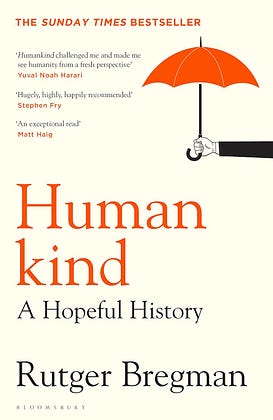Happy Saturday!
☀️This weekend, I am immersing myself in "Humankind: A Hopeful History" by Rutger Bregman again. I loved it the first time! This compelling book explores the idea that humans are naturally predisposed to connect, trust, and give, challenging traditional views of human nature. Bregman guides us through a narrative that reshapes our assumptions, illustrating how humans have evolved to thrive through cooperation and "Humankind," Bregman delves into the fundamental human need for connection and trust, suggesting that these traits are key to our success as a species. He highlights historical examples and modern research supporting the notion of humanity's innate kindness. The book shows how, throughout history, people have formed bonds and built societies based on shared values and mutual support.
Bregman also discusses how these inherent tendencies can be exploited by social media, AI, and algorithms. Platforms like LinkedIn, Facebook, and Instagram leverage our need to give and connect by encouraging us to share stories, give likes, and post personal photos, feeding into a cycle that benefits the platforms' agendas. This exploitation can create echo chambers where social interactions become commodified, affecting our perceptions of trust and connection, and creating a dynamic where social cooperation is rewarded, but dissent or non-conformity can lead to isolation through tactics like blackballing.
Humans have historically thrived in small groups, where close-knit bonds and trust form the foundation of a strong community. These groups foster a sense of identity and belonging, allowing individuals to work together for collective survival. However, the brave among us have always been willing to step outside these smaller circles, forging new paths to create new colonies, much like bees establishing new hives. This instinct for exploration and risk-taking has driven human expansion and innovation. Yet, the concept of one large connected swarm poses significant dangers, as centralised control can lead to a loss of individual freedom and adaptability, impacting the survival of a species 🐏 . A single swarm risks becoming monolithic, with reduced genetic diversity and heightened vulnerability to external threats. The balance between small, cohesive groups and the courage to explore new frontiers has been vital to human progress.
The book invites us to reimagine a more hopeful narrative for humanity, emphasising that even in the digital age, where technology can manipulate our instincts, there is a possibility to foster genuine connections and reshape how we engage with one another.
Central Questions:
How do social media algorithms manipulate our intrinsic need to give and connect?
What role does swarm theory play in amplifying or distorting the human capacity for trust and empathy?
Can we reverse the trends of algorithmic exploitation and rediscover authentic connections in the age of social media?

